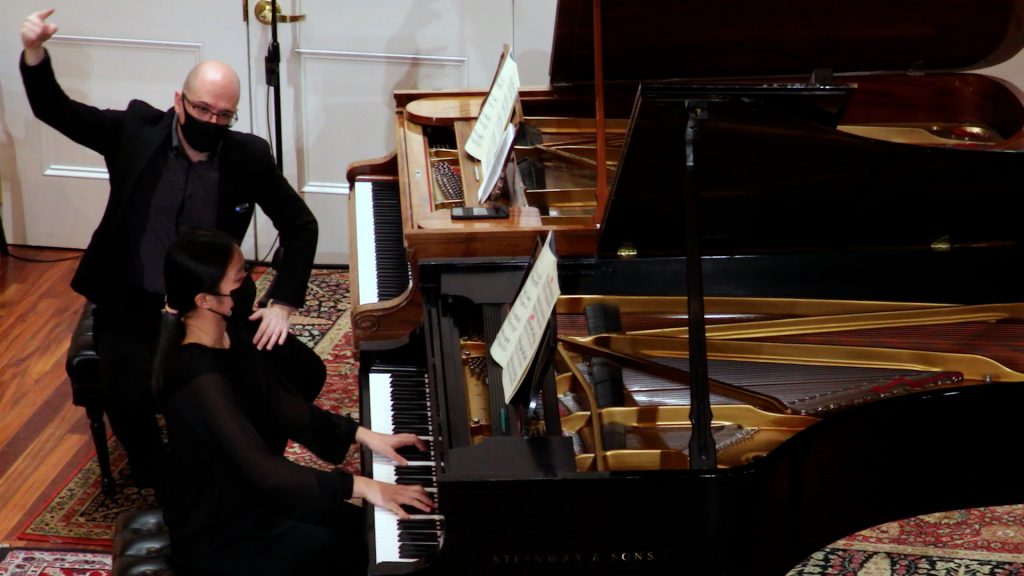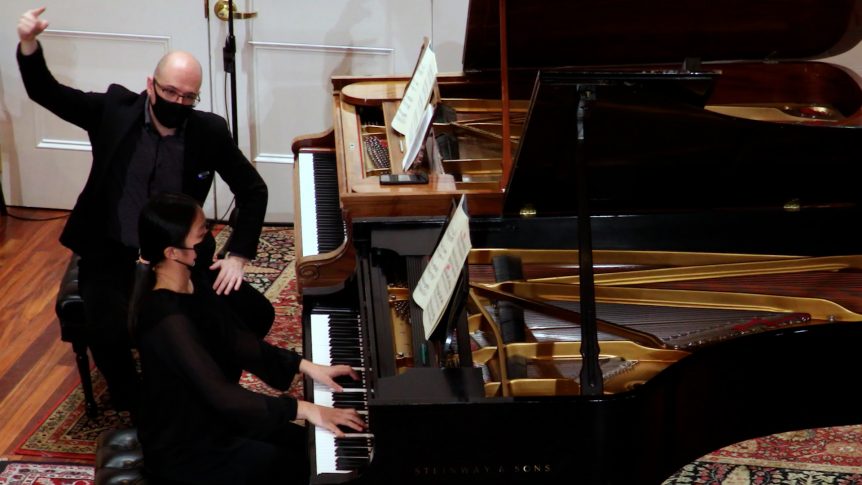
“Part of what makes music so great is that if you put 10 musicians in a room, you’ll get 15 opinions. There is not just one way to make music,” says cellist Bruce Coppock, chair of RSC’s Chamber Music Department and director of RSC’s ChamberMusicLab. “That’s why it’s so important for young musicians to hear different perspectives – and to learn over time to craft their own point of view. Master classes are a great opportunity for that kind of learning.”
A strong tradition at RSC, master classes are lessons with a guest teacher for select students in front of an audience. The goal is to provide the student with feedback on core elements like technique and musicality; however, music is subjective, so feedback can vary.
Roberto Plano, Associate Professor of Piano at Indiana University, who gave a piano master class at RSC last fall, explains, “Music is extraordinarily personal. The student may hear something from the teacher giving the masterclass they have never heard before from their other teachers. That feedback may even conflict, with one teacher suggesting you play one way here and another teacher suggesting you play that same part the exact opposite way. Young musicians learn to understand that people can have their own opinions and form their own opinion based on all of those perspectives.”
Violinist Jin-Kyung Joen, chair of the String Department at RSC, points out that the guest teacher’s input may inspire students to expand their conceptual understanding, and try different methods to obtain the desired results prescribed by their own teacher. “Sometimes students respond in a different way to the guest teacher.”
Master classes are valuable for all genres of music, notes saxophonist Philippe Crettien, who is Jazz Department Director for both RSC and The Rivers Upper School. He invites composers or soloists to share their expertise with students in a master class, followed by a concert in which students apply what they have learned.
Last fall, Crettien organized two master classes at The Rivers Jazz Festival with bass trombonist and tubaist Bill Lowe, who leads the Signifyin’ Natives band and has worked with masters of African American creative music across all genres. During his master classes, Lowe shared his approach to music, how to improvise as an ensemble, and how to create music together in a jazz setting before performing with his band and students.
Another example was guest teacher Tony Malaby, who came to RSC for a jazz master class. He taught different ways of improvising and new ways for students to express themselves as musicians with the current jazz of today. He took the class through the process of creating new music to the creation of a new recording of the work to the final product.
Crettien says, “Jazz is challenging because it goes from composed to improvised to no script – composers and guest artists have a lot to share with students. Master classes are amazing opportunities for students to get into the artist’s head and learn about their process. Having access to that artistry is unique, and there is no substitute for that as a young musician.”
Opening New Doors
Master classes are also beneficial because they introduce students to guest teachers from different genres, backgrounds, and parts of the world. Crettien points to Lowe as an example. “His background as a Black artist adds another dimension to the why and how of music because it comes from the place of the creator. He expresses his experience through music.”
The students in his master classes were “transformed” because it was a lived experience as opposed to just reading a history book. Master classes are hands-on learning opportunities on many levels, he says, noting that Lowe is returning to Rivers this spring to teach an Interdisciplinary Jazz History and American Culture class. “Master classes and collaborations with guest teachers open a whole new door to teaching about different perspectives in our community.”
The master classes at The Rivers Jazz Festival also provided a global point of view. At the end of the day, students performed with Bill Lowe’s professional band, which includes members from around the world. Their singer is from South Africa and the trumpeter is from China. “That was a very special performance for everyone,” he says.
Building Confidence
A significant benefit of master classes, according to Coppock, is the performance opportunity. He explains, “You can duplicate just about every aspect of playing an instrument in the practice room except for what it feels like to perform in front of an audience. I know extremely few musicians without some form of performance anxiety. It’s something one can only learn to manage through experience, especially young musicians without a breadth of experience.”
He points out that master classes are great opportunities for students to perform in front of not only an audience, but a different teacher.
Crettien agrees, noting that he begins every morning of the Rivers Summer Jazz Program with a master class. “We create an environment where the students feel safe taking risks by volunteering to play in the master class. Everyone gets a turn, and we encourage all of the kids to participate.”
Connecting with Audiences
Master classes have something to offer everyone who attends. While students clearly benefit from the master teacher’s feedback, the audience benefits by auditing a high-level music class.
Coppock says that he saw “a noticeable difference” in his ChamberMusicLab students’ performances after they started watching and hearing each other in weekly master classes. As they see each other’s performances in master classes over the course of the year, they are exposed to 10-12 pieces of music rather than just the one piece they are working on themselves.
“That is excellent for their development musically and the whole level of the group rises,” he says, noting that master classes also help audience members learn how to address common errors. “When someone makes an all-too-human mistake in a performance, the audience sees that this happens to them too and benefits from the teacher’s feedback.”
Another benefit, he points out, is the connection students can make with teachers at different institutions. For example, Randall Hodginkson is a faculty member at the New England Conservatory and Wellesley College and is one of the preeminent pianists in the Boston area. When he came to RSC for a master class, none of the four pianists in the ChamberMusicLab program had met him before, so that was a great opportunity. Students also had the opportunity to meet MIT Institute Professor and violist Marcus Thompson when he came to RSC to give a master class. “Whether our students go on to a conservatory or a university, they will likely continue to study music and these connections with faculty at other schools are beneficial for everyone.”
Plano says that he enjoys the audience aspect of master classes and tries to make them accessible by contextualizing the work, explaining his feedback and the history of the piece. “I can tell when I am really connecting with the audience when there is silence in the hall, and they are listening to every word. It is a beautiful experience,” he notes.
For Crettien, many of the master classes he teaches are focused on the audience. For example, he gives master classes with his quartet in local public schools as well as at Mechanic’s Hall in Worcester for public school kids. “In schools, I am the guest teacher for music students. At Mechanic’s Hall, the kids come to watch a performance and I explain the different types of jazz and its history. It’s an educational performance.”
The master teachers also benefit from the classes. Plano explains, “It is our job as teachers to share our knowledge and master classes are a way to impact more students outside of our own institutions. We listen to talent and learn other points of view. We always say teachers learn from students – and that is true in music.”
Crettien agrees. “Every department at RSC offers master classes because it’s the RSC way. We look for opportunities to help students get to the next level musically. It’s also refreshing for faculty to have outside teachers visit RSC because it’s a form of professional development. I enjoy going to master classes in other genres like classical music because I can adapt those lessons back to jazz.”
He adds, “I can’t overemphasize the value of master classes. They are elevating for everyone.”
-By Meghan Laska

